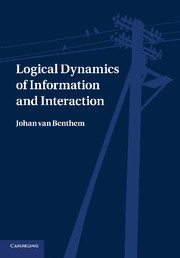Book contents
- Frontmatter
- Contents
- Preface
- Acknowledgments
- 1 Logical dynamics, agency, and intelligent interaction
- 2 Epistemic logic and semantic information
- 3 Dynamic logic of public observation
- 4 Multi-agent dynamic-epistemic logic
- 5 Dynamics of inference and awareness
- 6 Questions and issue management
- 7 Soft information, correction, and belief change
- 8 An encounter with probability
- 9 Preference statics and dynamics
- 10 Decisions, actions, and games
- 11 Processes over time
- 12 Epistemic group structure and collective agency
- 13 Logical dynamics in philosophy
- 14 Computation as conversation
- 15 Rational dynamics in game theory
- 16 Meeting cognitive realities
- 17 Conclusion
- References
- Index
3 - Dynamic logic of public observation
Published online by Cambridge University Press: 07 October 2011
- Frontmatter
- Contents
- Preface
- Acknowledgments
- 1 Logical dynamics, agency, and intelligent interaction
- 2 Epistemic logic and semantic information
- 3 Dynamic logic of public observation
- 4 Multi-agent dynamic-epistemic logic
- 5 Dynamics of inference and awareness
- 6 Questions and issue management
- 7 Soft information, correction, and belief change
- 8 An encounter with probability
- 9 Preference statics and dynamics
- 10 Decisions, actions, and games
- 11 Processes over time
- 12 Epistemic group structure and collective agency
- 13 Logical dynamics in philosophy
- 14 Computation as conversation
- 15 Rational dynamics in game theory
- 16 Meeting cognitive realities
- 17 Conclusion
- References
- Index
Summary
Having laid the groundwork of semantic information and agents’ knowledge in Chapter 2, we will now study dynamic scenarios where information flows and knowledge changes by acts of observation or communication. This chapter develops the simplest logic in this realm, that of public announcement or observation of hard information that we can trust absolutely. This simple pilot system raises a surprising number of issues, and its design will be a paradigm for all that follows in the book. We start with motivating examples, then define the basic logic, explore its basic properties, and state the general methodology coming out of this. We then sum up where we stand. At this stage, the reader could skip to Chapter 4 where richer systems start. What follows are further technical themes, open problems (mathematical, conceptual, and descriptive), and a brief view of key sources.
Intuitive scenarios and information videos
Recall the Restaurant scenario of Chapter 1. The waiter with the three plates had a range of six possibilities for a start, this got reduced to two by the answer to his first question, and then to one by the answer to the second. Information flow of this kind means stepwise range reduction.
Information
- Type
- Chapter
- Information
- Logical Dynamics of Information and Interaction , pp. 45 - 75Publisher: Cambridge University PressPrint publication year: 2011
